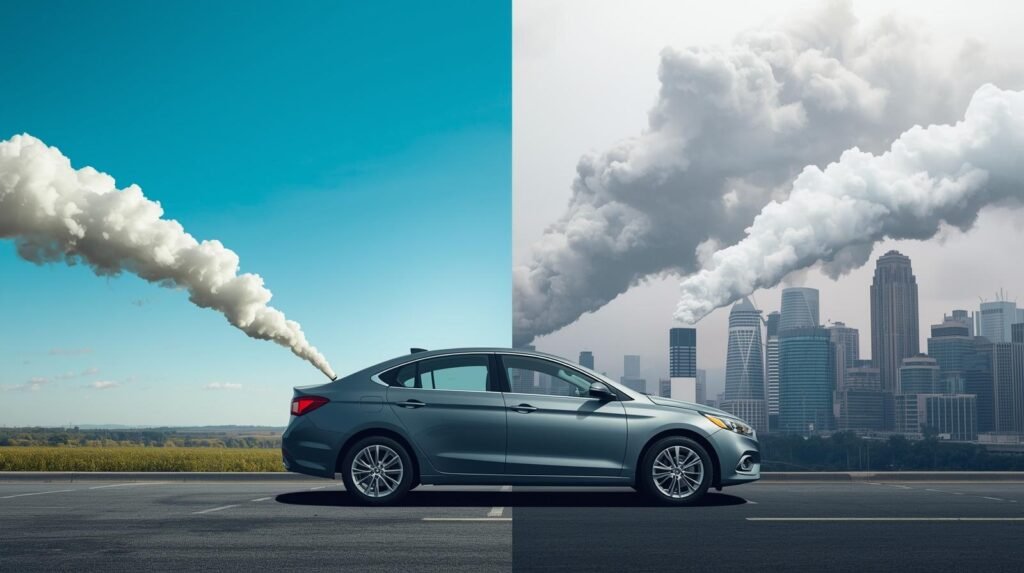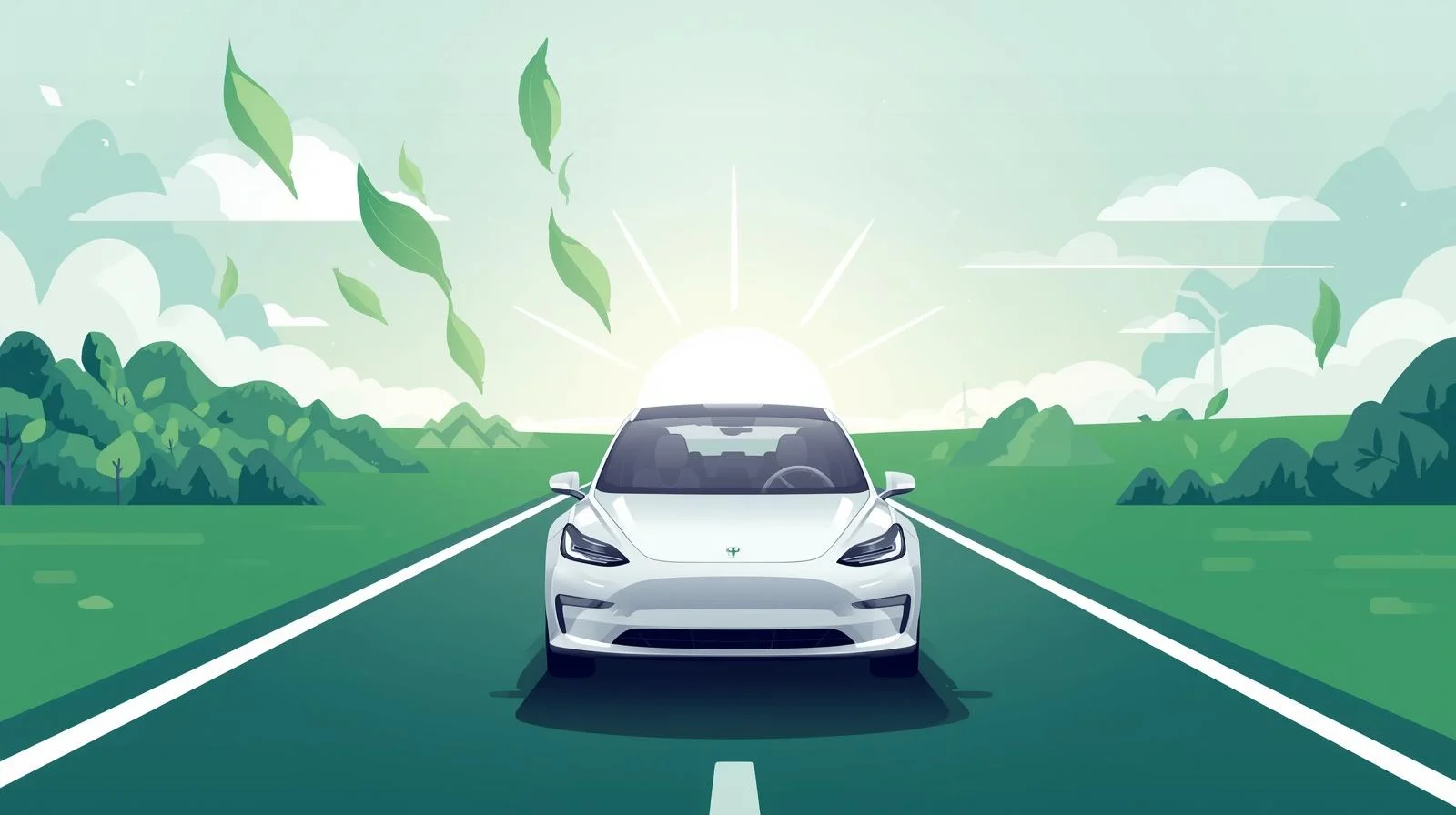It may be true that gasoline-powered cars may be the trend on the road, but behind the doors, these cars are causing huge damages to our planet. Gas cars contribute to some of the largest environmental issues that we face nowadays, starting with air pollution and climate change to resource depletion.
This blog post will dissect the reasons why gas vehicles are bad to the environment, reveal the ten reasons why gas cars are bad and provide an answer to whether gas cars are worse to the environment than electric cars. Everything so easy, and plain to anyone.
What Makes Gas Cars So Harmful?
We can start by getting to know what is really going on when you press the gas pedal.
Gasoline is a fossil energy source- i.e., it is fossil fuel, which is composed of old organic substances, buried deep in the earth. Its extraction, refineries, transportation and combustion of the resulting product cause a release of harmful pollutants and greenhouse gases into the environment. Gasoline also produces carbon dioxide (CO2) which contributes significantly to global warming when burnt in car engines.
In a nutshell: Gasoline cars = polluting, emitting and climatic effects in the long-term.

10 Reasons Why Gas Cars Are Bad for the Environment
The following list is straightforward, and it will be easy to comprehend why gas-powered vehicles are harmful.
1. High Carbon Emissions
Millions of tons of CO2 are emitted per annum by gas cars. A single gallon of gasoline that gets burnt, releases nearly 19.6 pounds of carbon dioxide. Not to mention multiplying this to billions of gallons a year, a disaster on a global level ensues.
2. Air Pollution
Nitrogen oxides (NOx), carbon monoxide (CO) and particulate matter (PM) are also emitted during burning of gasoline and these are polluting gases. These are pollutants that may cause asthma, bronchitis and other severe health complications.
3. Smog Formation
The smoky, contaminated heavens in big cities? Yep, gas cars contribute substantially to the production of urban smog, which makes the environment unhealthy to breathe.
4. Global Warming
Gas cars produce CO2 and methane that trap heat in the atmosphere of the earth. This causes the increase in global temperatures, melting ice caps and extreme weather.
5. Oil mining kills ecosystems.
Oil drilling usually destroys natural habitats. The forests, oceans and wildlife all suffer at the expense of fuel. Consider oil spills, pipeline leakages and land degradation.
6. Non-Renewable Resource Use
Gasoline is an exhaustible resource. Once it’s gone, it’s gone. However we are burning it out with all of the gas-powered vehicles on the road.
7. Pollution of Fuel Transportation.
It takes pipelines, ships and trucks to get gas in the oil well to your local station and the process releases its own emissions.
8. Engine and Brake Pollution
Engines, braking systems and tires also release small pieces of metal and rubber that are emitted by gas cars. These particles are deposited in the air, soil and waterways.
9. Noise Pollution
Gas engines are noisier than electric and it leads to the urban noise pollution, which impacts both human beings and wildlife.
10. Lower Efficiency
Only about 2030 percent of fuel energy can be transformed into actual movement by gasoline engines. That is a lot of wasted energy when compared to electric motors that have an efficiency of more than 70% at minimum.
Are Gas Cars Worse for the Environment Than Electric?
Short answer? Yes. Big time.
Though not entirely clean, EVEs are a lot better than gas cars. Here’s why:
- Zero tailpipe: No toxic emissions and CO2 when driving.
- More efficient: EVs are more efficient with respect to energy.
- Renewable powerable: Solar, wind and hydropower.
- Reduced maintenance: Few components, reduced wastes.
- Better battery: EV batteries are now reusable and recyclable.
- The carbon footprint of EVs is an order of magnitude smaller than the gasoline vehicles during their lifetime even with the production of batteries included.
- Study tip: In 2021, the International Energy Agency (IEA) issued a report that stated that EVs produce half the amount of CO2 during their lifetime when compared to gas vehicles- even when recharged using non-renewable resources.
Why Are Gasoline Cars Bad for the Environment?
Let’s revisit this core question in simpler terms.Zero tailpipe: No toxic emissions and CO2 when driving.
More efficient: EVs are more efficient with respect to energy.
Gasoline cars:
- Use dirty fuel
- Pollute the air
- Warm the planet
- Destroy nature
- Aren’t sustainable
They may seem convenient, but they come at a hidden cost—your health, your climate, and your future.
But What About Hybrid Cars?
Hybrids are better than gas-only cars though they are also fossil fuel burners. They are a step in the right direction but not the long term solution. They still:
- Emit CO2
- Depend on gasoline
- Needs to be serviced and replaced with parts that are causing pollution.
In the event that you can get the full electric, the greener option goes.
What Can You Do?
You do not have to go out and buy a Tesla in the middle of the night but there are things you can do to lessen the impact of your vehicle on the environment:
- Use walk or bikes where possible.
- Choose public transport
- Have a carpool with colleagues or friends.
- Change to electric or hybrid vehicles.
- Keep your existing gas car to be efficient (clean air filters, put on correct tire pressure, frequent check ups)
Every small change helps.
Why are gas cars harmful to the environment?
They release toxic wastes and CO2 into the air, which lead to the climate change and air pollution.
Are gas automobiles more harmful to the environment than electric cars?
Yes, the gas cars are more carbon-emitting, inefficient, and dependent on fossil fuels.
Is it possible to make gasoline cars more environmental-friendly?
Only to a point. You will be able to be a little more fuel-efficient and a little less emitting, but they will not be as green as EVs.
Is the transformation to electric costly?
Upfront, yes. However, EVs will end up spending less over time due to reduced fuel and maintenance expenses- and tax incentives!
What is the impact of gas cars on our health?
The effects of emissions are respiratory diseases, cardiac problems, and poorer quality of air, particularly in cities.
Conclusion
But then, why do we not like gasoline cars with the environment? They not only pollute the air but also contribute to climate change and they do it on a resource that is dwindling and in the process destroying the ecosystems. Although human development has been dependent on gas cars over a hundred years, it is the time to switch to smarter, cleaner, and more sustainable movement.
You are not alone in the event that you drive a gas car. But now that you are in the know about the facts, how about the alternatives. Switch to EVs in the near future, eliminate unnecessary drive, and increase awareness. Thou shalt not regret it to the earth–or to thy lunges.

